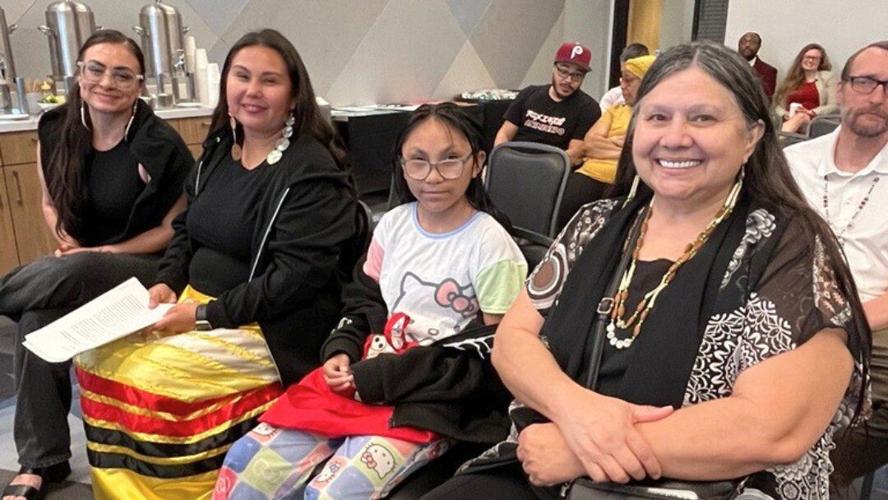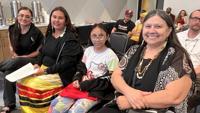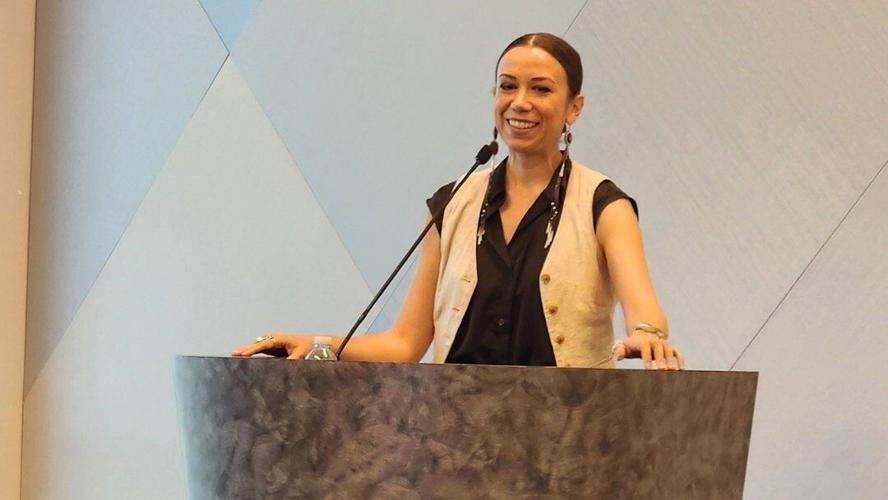
Photo credit: California Civil Rights Department
In partnership with the Shingle Springs Band of Miwok Indians, the Commission on the State of Hate conducted a community forum titled “Resilient Roots: California’s Indigenous Communities and the Struggle Against Hate.” The event took place at the Apex at Red Hawk Resort in Placerville, CA on Saturday, May 11, and was also broadcast virtually for members of the public.
The forum addressed the ongoing crisis of discrimination and violence that California's Indigenous communities face. Speakers emphasized the importance of acknowledging and responding to the effects of historical trauma, high suicide rates, missing and murdered Indigenous women and inadequate infrastructure.
One of the topics of importance that was raised was the alarming rates of missing and murdered Indigenous women and girls in the United States, particularly in states like California. May 5 is recognized as the National Day of Awareness for Missing and Murdered Indigenous Peoples (MMIP), which is meant to draw attention to the epidemic of violence experienced by Native Americans and the lack of resources allocated to help track down missing Indigenous people.
Morning Star Gali, Project Director of Restoring Justice for Indigenous Peoples, a nonprofit organization working to expose and address the disparities of California Indigenous people, called the issue ‘nuanced.’ Gali, a member of the Ajumawi band of Pit River Tribe, said there are many contributing factors to the issue. She cited complex jurisdictions, racial discrimination, strategies to silence human rights defenders, attempts to forcibly move Indigenous peoples out of their homelands and environmental violence.
According to data, homicide is the third leading cause of death among American Indian and Alaska Native women between 10 and 24 years of age and the fifth leading cause of death for American Indian and Alaska Native women between 25 and 34 years of age. Advocates have criticized the lack of response from law enforcement and inadequate news coverage for missing Indigenous people, especially during the first few days of a crucial investigation.
In August 2021, Bessie Walker was reported missing from her hometown in Auberry, California. Walker’s body was discovered about 100 yards from a family member’s home two weeks later, according to the sheriff’s office.
The mother of three disappeared around the same time that Gabby Petito, a white woman in her 20s, went missing. Petito’s case, however, garnered considerably more attention from the media and a national man-hunt led by law enforcement across the nation.
A 2023 published report released by The Congressional Research Service on the discriminatory erasure of native people indicated several systemic barriers that hinder the federal government’s and criminal justice systems’ ability to fully understand and address MMIP.
Key findings from the report echoed many of the same points made by speakers and other Indigenous advocates. Complicated jurisdictional overlaps between federal, state, local and tribal law enforcement can lead to confusion regarding responsibility for investigations and prosecutions of crimes that occur on tribal land.
Gali noted during the forum that most of the violence experienced by Indigenous individuals is at the hands of outsiders. “In the United States, 85% of Indigenous women are affected by sexual violence” she stated, “97% of those assaults are perpetrated by non-Indigenous peoples.” The numbers are undoubtedly much higher due to a lack of accurate tracking data, leading to gaps in prosecution efforts by law enforcement.
This is part of the reason why so many have highlighted the importance of advocating for policy at the state level that emphasizes the need for accountability and more comprehensive data collection.
Christina Snider-Ashtari, the Tribal Affairs Secretary for the Office of Governor Gavin Newsom, emphasized the significance of not only amplifying native perspectives but also of non-Indigenous individuals taking the initiative to educate themselves in areas where there are knowledge gaps.

Christina Snider-Ashtari, the Tribal Affairs Secretary for the Office of Governor Gavin Newsom speaks at the “Resilient Roots” forum on Saturday, May 11. Photo Credit: California Civil Rights Department.
“We're confronted with a dominant population and a public who through willful ignorance, asks ‘don't the tribes have enough?’” said Snider-Ashtari. “Those are easy answers, but it requires people to understand that there's this gap in knowledge.”
The Secretary of Tribal Affairs stated that a lack of education on Indigenous history leads to a deadlock in passing policies that benefit native communities. “Native people are having to educate everybody else on our painful trauma for us to get anything done,” she says.
Without the implementation of thorough policies aimed at creating comprehensive responses to incidents of anti-Indigenous violence, Snider-Ashtari says the community will continue to be at risk and vulnerable to harm.
This is especially true for native women like Morning Star Gali, and others, who have been on the front lines of awareness campaigns at the local and state levels.
“Native women face murder rates more than 10 times the national average,” said Gali. “Even though we are 1.1% of the total U.S. population and 2.2% of the U.S. population of women.”













(0) comments
Welcome to the discussion.
Log In
Keep it Clean. Please avoid obscene, vulgar, lewd, racist or sexually-oriented language.
PLEASE TURN OFF YOUR CAPS LOCK.
Don't Threaten. Threats of harming another person will not be tolerated.
Be Truthful. Don't knowingly lie about anyone or anything.
Be Nice. No racism, sexism or any sort of -ism that is degrading to another person.
Be Proactive. Use the 'Report' link on each comment to let us know of abusive posts.
Share with Us. We'd love to hear eyewitness accounts, the history behind an article.